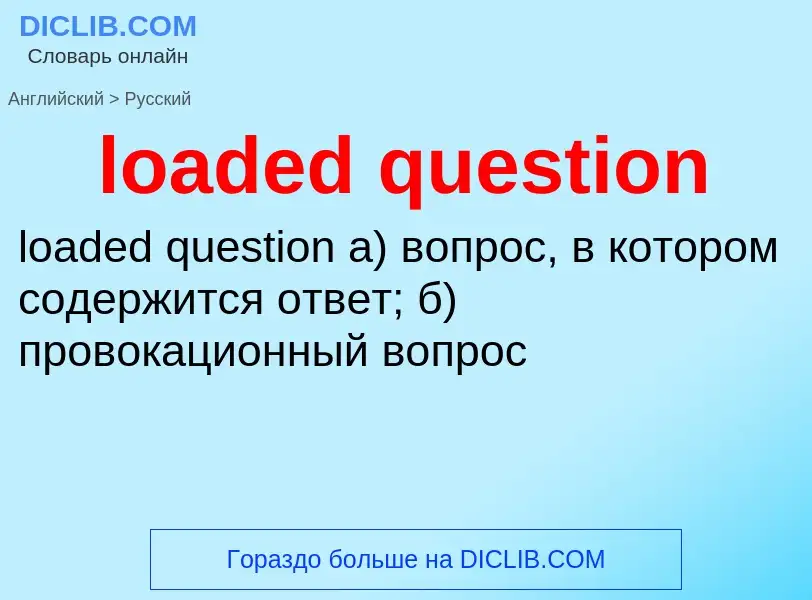Перевод и анализ слов искусственным интеллектом ChatGPT
На этой странице Вы можете получить подробный анализ слова или словосочетания, произведенный с помощью лучшей на сегодняшний день технологии искусственного интеллекта:
- как употребляется слово
- частота употребления
- используется оно чаще в устной или письменной речи
- варианты перевода слова
- примеры употребления (несколько фраз с переводом)
- этимология
loaded question - перевод на Английский
общая лексика
вопрос, в котором содержится ответ
провокационный вопрос
['kwestʃ(ə)ntæg]
грамматика
краткий общий вопрос (в конце расчленённого вопроса)
['kwestʃtntaɪm]
общая лексика
время запросов (с 14 ч. 45 мин. до 15 ч. 30 мин. с понедельника по четверг отводится для ответов премьер-министра [Prime Minister] и министров в палате общин [House of Commons] на вопросы членов парламента; обыкн. вопросы подаются заранее в письменном виде; ответы даются как устно, так и письменно)
парламентское выражение
заседание английского парламента
на котором его члены получают ответы министров на свои вопросы
математика
открытая область
общая лексика
веское слово
Определение
Википедия
A loaded question is a form of complex question that contains a controversial assumption (e.g., a presumption of guilt).
Such questions may be used as a rhetorical tool: the question attempts to limit direct replies to be those that serve the questioner's agenda. The traditional example is the question "Have you stopped beating your wife?" Whether the respondent answers yes or no, they will admit to having beaten their wife at some time in the past. Thus, these facts are presupposed by the question, and in this case an entrapment, because it narrows the respondent to a single answer, and the fallacy of many questions has been committed. The fallacy relies upon context for its effect: the fact that a question presupposes something does not in itself make the question fallacious. Only when some of these presuppositions are not necessarily agreed to by the person who is asked the question does the argument containing them become fallacious. Hence, the same question may be loaded in one context, but not in the other. For example, the previous question would not be loaded if it were asked during a trial in which the defendant had already admitted to beating his wife.
This informal fallacy should be distinguished from that of begging the question, which offers a premise whose plausibility depends on the truth of the proposition asked about, and which is often an implicit restatement of the proposition.

![[[David Cameron]] answering Prime Minister's Questions in 2012 [[David Cameron]] answering Prime Minister's Questions in 2012](https://commons.wikimedia.org/wiki/Special:FilePath/David Cameron Dispatch Box.jpg?width=200)
![[[Ichirō Ozawa]] and [[Yasuo Fukuda]] debate each other during a Question Time session in January 2008. [[Ichirō Ozawa]] and [[Yasuo Fukuda]] debate each other during a Question Time session in January 2008.](https://commons.wikimedia.org/wiki/Special:FilePath/Ichiro Ozawa and Yasuo Fukuda 20080109.jpg?width=200)
![Leader of the Opposition]] [[Andrew Scheer]], poses a question during [[Question Period]] in March 2019 Leader of the Opposition]] [[Andrew Scheer]], poses a question during [[Question Period]] in March 2019](https://commons.wikimedia.org/wiki/Special:FilePath/Question Period (32688924037).jpg?width=200)
